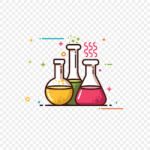Chemistry and Advanced Technology: Revolutionizing Industries
Welcome to our website dedicated to the dynamic fusion of chemistry and advanced technology. Chemistry plays a transformative role in driving innovations that push the boundaries of various industries, revolutionizing the way we live, work, and interact with the world around us. Join us as we explore the exciting world of chemistry and advanced technology, uncovering the groundbreaking applications and advancements that are shaping the future.

- Materials Science and Engineering: Chemistry drives advancements in materials science and engineering. Chemists work on designing and synthesizing advanced materials with tailored properties and functionalities. These materials find applications in aerospace, electronics, healthcare, and many other industries, enabling the development of cutting-edge technologies and devices.
- Nanotechnology and Nanomaterials: Chemistry plays a pivotal role in nanotechnology, which involves manipulating matter at the nanoscale. Chemists develop nanomaterials with unique properties and functionalities, opening doors to breakthroughs in electronics, energy storage, medicine, and environmental remediation. These advancements have the potential to revolutionize various industries.
- Biotechnology and Pharmaceuticals: Chemistry contributes to advancements in biotechnology and pharmaceuticals. Chemists work on designing and synthesizing new drug molecules, developing drug delivery systems, and optimizing manufacturing processes. These advancements enhance drug efficacy, improve patient care, and contribute to the development of personalized medicine.
- Energy and Sustainable Technologies: Chemistry plays a crucial role in developing energy and sustainable technologies. Chemists work on improving energy conversion and storage systems, developing catalysts for efficient chemical reactions, and exploring alternative energy sources. These advancements address the global challenges of energy sustainability and climate change.
- Artificial Intelligence and Data Science: Chemistry intersects with artificial intelligence and data science, enabling advancements in molecular modeling, drug discovery, and materials design. Chemists work on developing algorithms and computational tools to analyze complex chemical data, predict molecular behavior, and accelerate the discovery of new materials and compounds.
- Advanced Analytical Techniques: Chemistry drives advancements in analytical techniques. Chemists develop sophisticated instruments and methods for characterizing and analyzing complex samples, such as mass spectrometry, spectroscopy, and imaging techniques. These tools provide valuable insights into molecular structures and properties, facilitating research and development across various industries.
- Collaborative Research and Innovation: Chemistry fosters collaboration among scientists, engineers, and industry experts to drive research and innovation in advanced technology. Through interdisciplinary collaboration and knowledge exchange, chemists work together to address complex challenges and unlock new possibilities in fields such as materials science, nanotechnology, biotechnology, and energy.
At our website, we explore the dynamic fusion of chemistry and advanced technology, uncovering the principles, applications, and advancements that are driving innovation and shaping the future of various industries. Join us as we delve into materials science and engineering, nanotechnology and nanomaterials, biotechnology and pharmaceuticals, energy and sustainable technologies, artificial intelligence and data science, advanced analytical techniques, and collaborative research and innovation. Welcome to a place where chemistry and advanced technology converge to revolutionize industries and propel us into a new era of possibilities.

